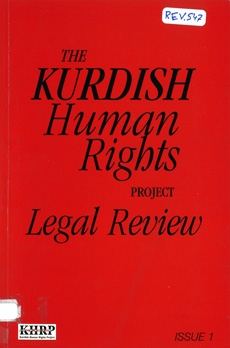|
EDITORIAL
This is the first edition of a new human rights journal which will be published by the Kurdish Human Rights Project (KHRP) twice a year.
Since 1996 KHRP has published reports on cases taken to the European Court of Human Rights (The Court). Starting with the case of Akdivar v Turkey, KHRP has published 12 case reports over the last seven years. As well as including copies of the decisions of the European Commission and European Court of Human Rights, these case reports have provided commentaries explaining the background to, and context of, the cases, which have concerned a wide range of human rights violations: extra-judicial killings; deaths in custody, village destruction; torture; disappearances and violations of the right to freedom of expression. The last KHRP Case Report was published in August 2002, covering the landmark judgment in Sadak and others v Turkey, concerning the removal from office of the Democracy Party MPs.
With the decisions of the European Court of Human Rights having become widely available on the internet, KHRP has decided to stop producing the case reports and to publish this journal in their place. The journal will therefore include summaries of and commentaries on cases taken by KHRP to the Court (as well as cases against Turkey, the journal will in future include Court cases brought against Armenia and Azerbaijan, both of which ratified the European Convention on Human Rights in April 2002). This will include reports on cases not only at the admissibility stage and the judgment, but also where possible at the earlier stage where a case is first 'communicated' by the Court to the Respondent Government. It is intended that the journal will incorporate a practical focus, providing lawyers in the region with clear guidance on how to be most effective in taking human rights cases.
The journal's scope will be wide-ranging, including legal human rights developments in the region in which KHRP operates, including Turkey, Armenia, Azerbaijan, Iran, Iraq and Syria. The journal will also incorporate important Court judgments against other Council of Europe states which have relevance to the 'KHRP region', as well as significant human rights developments within other regional and international human rights systems. For example, in this first edition, we have included the case concerning the dissolution of the Refah party in Turkey, as well as the important decision on jurisdiction in Bankovic, concerning the NATO bombing of the television station in Belgrade.
As we recognise that the dissemination of case reports and information on human rights in languages other than in English or French is still very limited, the journal will be published initially in both English and Turkish. It is also planned to publish future editions in Armenian and Azeri.
The format of the journal will be to cover new human rights developments in the first pages, followed by the case summary and commentary section, which will form the main part of the journal. There will also be occasional articles providing a more in-depth analysis of newsworthy topics written by members of KHRP's respected legal team, including lawyers and human rights commentators from the region itself.
In this first edition, we cover Court admissibility decisions and judgments from May 2000 to December 2001. A second edition to be published later this year will cover the period from December 2001.
Section 1
Legal Developments in the Kurdish Regions
1."Neither Friendly nor a Settlement":
The Consequences Of The European Courts Decision In Akmanv Turkey
(By Jeremy McBride)
The European Court of Human Rights rightly has, like all courts, means to ensure that the list is not clogged up with cases no longer requiring its attention. Thus Article 37 of the Convention authorises it to strike out any case where there is no intention to pursue it, the matter has been resolved or 'for any other reason established by the Court' continued examination is no longer justified. The need for the first and second of these grounds can readily be appreciated but any concern about the seemingly far too open-ended nature of the third - whose use was intended by its drafters to be used only in circumstances comparable to the first two grounds -ought to be assuaged by the overriding obligation on the Court to continue the examination of a case 'if respect for human rights as defined by the Convention ... so requires'. This qualification on the power to strike out a case is essentially similar to the limitation on settlements between parties that can be accepted which in the past has ensured that a State cannot simply buy off an applicant but must also address the underlying human rights problem that has given rise to his or her application. However, confidence that this qualification will continue to be applied in an appropriately rigorous manner - whether in connection with an apparent settlement or any other supposed ground justifying a case to be struck out - has been severely shaken by the Court's rulings in three cases against Turkey, Akbay , Akman and 11,1 S, K E and A Ö.
…..
| 